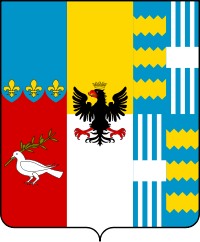Doria-Pamphili-Landi
| Doria-Pamphili-Landi Doria-Pamphili | |
|---|---|
| Noble house | |
|
| |
| Country | Italy |
| Estates |
Palazzo Pamphilj (Rome) Palazzo Doria d'Angri (Naples) Other locateds in Genoa and Rome |
| Titles |
|
| Style(s) | His Excellency (Cardinal) |
| Founded | 1610 |
| Founder | Giovanni Andrea II Doria |
| Ethnicity | Italian |
| Cadet branches | |
The House of Doria-Pamphili-Landi (also called simply Doria-Pamphili) is a princely Roman family of Genoese extraction. Legend has that the origins of the Doria family date from the early 11th century, but the authentic pedigree is traced to Ansaldo d'Oria, consul of Genoa in the 12th century. The descent of the several Doria lines in Genoa is well-known and appears described in Natale Battilana's 19th century genealogical study of old Genoese families.
The Doria-Pamphili-Landi princely family is a subbranch of the Doria di Oneglia branch: in 1291 two Doria brothers bought the lordship of Oneglia, which was co-owned by their descendants until the late 15th century. Admiral Andrea Doria was descended from a Doria di Oneglia, Genoese soldier Aitone Doria (also called Antonio Doria) who fought for the French at the battle of Crécy.
Andrea Doria
One of the most famous members of the family was Andrea Doria, perpetual censor of Genoa in 1528 and admiral to the emperor Charles V, who was created Prince of Melfi (1531) and marquis of Tursi (in the kingdom of Naples) in 1555.[1] These titles were inherited by Gian Andrea Doria, son of Giannettino Doria who was a second cousin and adopted son of Andrea Doria. Giannettino Doria was killed in 1547 during the Fieschi conspiracy against the power of Andrea Doria over Genoa and his descendants inherited the titles granted to the great Admiral. Another famous member of the family was Cardinal Giovanni Battista Pamphilj, who rose to the Papacy as Pope Innocent X.
The marquisate of Civiez and the county of Cavallamonte were conferred on the family in 1576, the duchy of Tursi in 1594, the principality of Avella in 1607, the duchy of Avigliano in 1613, the principality of Meldola in 1671. In 1760 the title of Reichsfurst or prince of the Holy Roman Empire was added and attached to the lordship of Torriglia and the marquisate of Borgo San Stefano, together with the qualification of Hochgeboren. That same year the Dorias inherited the fiefs and titles of the house of Pamphili of Gubbio, patricians of Rome and self-styled princes of the San Martino, Valmontone, Val di Taro, Bardi, and Corupiano comunes.[1] They had already incorporated by marriage the wealthy inheritance of the Landi family.
Palazzo Doria Pamphili
The Palazzo Doria Pamphili in Rome was built in the 17th century, and contains one of the most valuable private collections of paintings in the world, the Doria Pamphilj Gallery. The Villa Doria Pamphili was, during the siege of 1849 Giuseppe Garibaldi's headquarters.[1]
Recent generations
Prince Filippo Andrea VI Doria Pamphili, a staunch anti-Fascist, in 1944 became the first mayor of Rome following its liberation by the Allies (One of his ancestors had been the second mayor of the newborn Kingdom of Italy in 1870).
Princess Orietta Doria-Pamphili-Landi, the last of the line, married Royal Navy Commander Frank George Wignall Pogson (1923-1998)[2] in London in 1958. He changed his name to Frank George Wignall Pogson Doria Pamphilj by deed poll.
After the reforms of the Second Vatican Council in the 1960s, Princess Orietta and her husband, both Catholics, worked to promote better relations between faiths. In 2000, Queen Elizabeth II visited Rome and attended the Anglican Centre, which is housed in the Palazzo Doria Pamphilj.
The couple adopted two children: Gesine Margaret Orietta Mary Pogson Doria Pamphilj (born 1964), known as Gesine Doria, married Massimiliano Floridi, with whom she has four children: Anna, Elisa, Orietta and Irene. Jonathan Doria Pamphilj (born 1963) formed a civil partnership with Elson Edeno Braga, and has two children by surrogacy: Emily and Filippo Andrea VII.
The ability of Jonathan Pamphilj's children to inherit, after his death, was called into question in October 2009 and legal action was taken by Gesine Doria on this point. On the basis that Pamphilj's children were born of surrogate mothers, Doria claimed that a recently passed Italian law on assisted procreation debarred them from inheriting on the grounds that a sperm donor could not claim parentage of a child and that only the mother who had given birth to the infant had the legal right to look after it.[3] In 2010 a court in Rome declined to hear the case.[4]
See also
- Pamphili with inclusive family tree.
References
- 1 2 3
 One or more of the preceding sentences incorporates text from a publication now in the public domain: Chisholm, Hugh, ed. (1911). "Doria-Pamphilii-Landi". Encyclopædia Britannica. 8 (11th ed.). Cambridge University Press. p. 428.
One or more of the preceding sentences incorporates text from a publication now in the public domain: Chisholm, Hugh, ed. (1911). "Doria-Pamphilii-Landi". Encyclopædia Britannica. 8 (11th ed.). Cambridge University Press. p. 428. - ↑ Hanley, Anne (8 October 1998). "Obituary: Frank Pogson Doria Pamphilj". The Independent. London.
- ↑ Willey, David (13 October 2009). "Adopted 'nobles' at war over vast fortune". BBC. Retrieved 14 October 2009.
- ↑ Prince wins battle for his children's claim to wealth, Sydney Morning Herald, December 17, 2010,
Sources
- N. Battilana, "Famiglia Doria" in Genealogia delle Famiglie Nobili di Genova, 1827.
